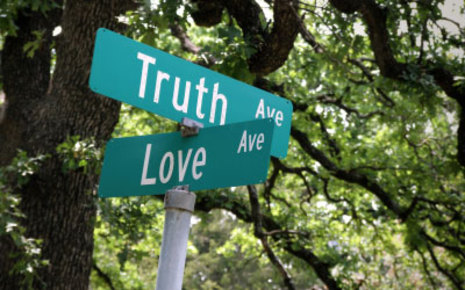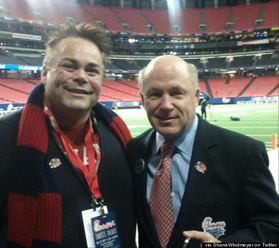Truth and love in combination needed today
 Meet Jose. He’s an undercover narcotics agent. He spends time with substance abusers, people whose bad choices have brought devastating consequences. That’s one kind of person Jose deals with daily. A drug user.
Meet Jose. He’s an undercover narcotics agent. He spends time with substance abusers, people whose bad choices have brought devastating consequences. That’s one kind of person Jose deals with daily. A drug user.
Jose also deals with drug pushers, people who sell to users. Pushers peddle addiction, suffering and death. They’re not concerned about the effects their product have on the users.
The user—who abuses his own body and messes up his own world—is responsible for his destructive decisions. But the pusher—who devastates individuals and families, harms communities and nations—has a responsibility much more profound.
Both are made in the image of God. Both are fallen. Both need to repent. Neither is outside the mercy and grace of Jesus Christ. But Jose, himself a Christian, communicates with them differently.
Jose’s posture toward the user is marked by gentle, compassionate grace. He sees this as a rescue operation. He speaks like Jesus talking to the woman caught in adultery. “Neither do I condemn you. Go now and leave your life of sin” (John 8:11). He speaks the truth in love.
Jose also speaks the truth in love to the pusher. But his posture is different, more like Jesus’ words to religious leaders: “Woe to you lawyers also! For you load people with burdens hard to bear, and you yourselves do not touch the burdens with one of your fingers” (Luk 11:46 ESV).
To both, Jose speaks the truth in love. But his message and tone differ according to the context.
I offer that little fable to illustrate a parallel reality. Let’s translate Jose’s story from drug use to homosexual behavior. As with the former, so with the latter: two kinds of people populate the world of homosexual behavior. Some are users, some are pushers.
 Truth and love toward “users”
Truth and love toward “users”
The users might be a same-sex couple living next door. They appear much like any other couple (except for the obvious difference). They go to work. Mow their grass. Walk the dog. They aren’t looking to change the world. They just want a normal life, want to be accepted by the society.
Christians in relationship with users have a challenging assignment: to show genuine love and, as opportunity allows, to speak the truth.
In today’s culture, where tolerance is the only virtue, it’s not hard to show love at some level. Speaking the truth (without which, by the way, we aren’t truly loving) is another matter. And we’re called to do both. When we’re in relationship with users, we have a basis for truth-in-love conversations.
My friend who drove a city bus learned to do this, even in the politically correct environment of Portland, Oregon. Exhibit A: conversations with a lesbian in which he gradually introduced truth and biblical language. She surmised he must be a Christian and quickly became defensive, spoke of people who look down on “sinners” like her. His response was worthy of emulation: “Oh, want to talk about sin? Sure. Let’s start with mine.” He found a way to speak the truth in love.
It’s essential to recognize the distinction between the user and the pusher. The former may be among those who “not know what they do”; the latter is calculated in what he does.
How do we speak the truth in love to the pusher, who takes homosexuality (or transgenderism) to a deeper level than simply “live and let live”? Pushers have an agenda; they want to change the culture by imposing lies on society.
- “If you resist homosexuality you’re hateful.”
- “People who refuse to sanction homosexuality have no place in the society.”
- “Refusing to use my chosen pronouns is hateful.”
Truth and love toward “pushers”
Much of the time, battle lines separate us from pushers. But as with users, if we can speak from relationship, we are more likely to gain a hearing. Developing a relationship with a pusher, as opposed to the user next door, is problematic. But not impossible: Dan Cathy did it.
Sadly, the tensions between Christians and homosexual activists have increased since 2013. The gap is much wider, the path more difficult to navigate. Meanwhile, Ephesians 4:14-15 hasn’t faded: “… so that we may no longer be children, tossed to and fro by the waves and carried about by every wind of doctrine, by human cunning, by craftiness in deceitful schemes. Rather, speaking the truth in love, we are to grow up in every way into him who is the head, into Christ.” (ESV) To keep silent is to cede the battle to the enemy.
What does the speaking look like in today’s environment, where lies about human sexuality are destroying individuals and their families as well as our culture? In a world with no one pushing homosexual “rights” on others, the communication strategy of the church would be different. We wouldn’t need “push-back” articles of the kind we have published in this space, posts like, LGBT 9, Stutzman 0: Time for the Church to Rise Up, EVANGELICALS and SOGI Laws, Gender Delusion: Death to Binary.
Truth and love are not mutually exclusive
But we don’t live in such a world. Today’s sexual environment has left many evangelicals either unwilling to speak the truth in love, or uninformed about how. Some are suggesting it’s impossible for a heterosexual to speak the truth about homosexuality in love. Only someone who has actually made the pilgrimage out of homosexuality into holy sexuality has the right to speak in this difficult arena.
A month after the Orlando shooting which left 50 people dead, Darrow Miller wrote:
To speak the truth in love requires us to live in tension. If we seek to avoid the tension, we may lose both truth and love. If, without regard for our convictions, we simply “build bridges” to, say, the LGBT community, we have not only left truth behind, we have abandoned love. Conversely, if we speak truth without loving, then we have lost both truth and love.
Can we disagree with someone’s beliefs and behavior and still love them profoundly? Yes! Can we love someone profoundly who may hate our convictions and commitments? Yes! And we must!
Saddleback Church pastor Rick Warren has astutely said: “Our culture has accepted two huge lies. The first is that if you disagree with someone’s lifestyle, you must fear or hate them. The second is that to love someone means you agree with everything they believe or do. Both are nonsense. You don’t have to compromise convictions to be compassionate.”
Love and truth speaking are not mutually exclusive. We can find the way. May the Holy Spirit enable us in this vital dimension of life in a fallen world.
– Gary Brumbelow







